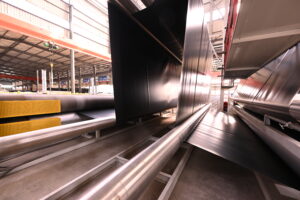What is PVC geomembrane?
PVC geomembrane is a material used in civil engineering and underground engineering. It is a geomembrane made of polyvinyl chloride (PVC, polyvinyl chloride). This type of geomembrane is very common in seepage control, groundwater protection, waste treatment, water management and other civil engineering applications.
Here are some of the main features and uses of PVC geomembrane:
Anti-seepage performance: PVC geomembrane has excellent anti-seepage performance and can effectively prevent water, chemicals and pollutants from penetrating into the soil. This makes it widely used in landfills, sewage treatment tanks, dams, ponds and other projects that require anti-seepage.
Chemical corrosion resistance: PVC geomembrane can resist corrosion from a variety of chemical substances, including acids, alkalis and salts. This makes it a reliable material for use in facilities that store hazardous waste or handle corrosive chemicals.
Weather resistance: PVC geomembrane has good weather resistance and can maintain stable performance under different climate conditions, including resistance to ultraviolet radiation.
Flexibility: PVC geomembrane is relatively flexible and easily adapts to various terrains and surfaces of engineering structures, thereby providing effective anti-seepage and isolation properties.
Easy to install: Installing PVC geomembrane is usually relatively easy and can be fixed on the engineering structure through welding, bonding or mechanical fixing.
Sustainability: PVC geomembrane is widely used in many projects to reduce environmental pollution, water resources management and soil protection. It helps preserve the environment and ensures the sustainability of the project.
Uses of pvc geomembrane
PVC geomembrane is widely used in civil engineering and underground engineering, mainly for anti-seepage, isolation, protection and reinforcement. Here are some of the main uses of PVC geomembranes:
Anti-seepage application: PVC geomembrane is mainly used for anti-seepage to prevent moisture, chemicals and waste from penetrating into the soil or underground structures. Such applications include landfills, wastewater treatment facilities, dams, reservoirs and levees to prevent leakage and protect the environment.
Waste treatment: PVC geomembrane is often used in landfills as an anti-seepage layer on the bottom and side walls to prevent waste from leaking into groundwater or soil.
Water Resources Management: PVC geomembrane can be used in water resources management projects such as reservoirs, ponds, channels and hydrological projects to reduce water waste and protect groundwater quality.
Soil isolation: In some projects, PVC geomembrane can be used to isolate different soil layers and prevent different layers of soil from mixing or interacting. This is important for soil stabilization and pollution control.
Soil reinforcement: PVC geomembrane can be used to reinforce soil and improve the soil’s bearing capacity and stability. This is very useful in projects such as road construction, airport runways, railway embankments, etc.
Hydrological Engineering: PVC geomembrane is also used in hydrological engineering projects, such as flood control projects and river bank protection, to reduce the impact of floods on land.
Mining: In the mining industry, PVC geomembranes are used to protect groundwater resources from contamination from mining activities.
Environmental Protection: PVC geomembranes can be used in a variety of environmental protection projects, including soil pollution cleanup, waste storage facilities, and environmental remediation.
PVC geomembranes have numerous uses in a variety of civil engineering and environmental engineering applications, primarily to control leakage, isolate hazardous materials and protect soil and water resources.
Its chemical resistance, weather resistance and flexibility make it a popular geotechnical material.

pvc geomembrane price
The price of PVC geomembrane varies depending on many factors, including thickness, size, brand, quality, etc. In addition, geographical location and market supply and demand will also affect prices. Below are some general price guidelines, but please note that these prices may vary in different regions and over time.
Thickness: The thickness of PVC geomembrane is usually one of the major factors in price. Thicker geomembranes are generally more durable, but also more expensive. Thin geomembranes are generally cheaper and suitable for light-duty applications.
Size: The size of the geomembrane will also affect the price. Custom-sized geomembranes are typically more expensive than standard sizes.
Brand and Quality: Some well-known brands of geomembranes may cost more because they generally offer higher quality and reliability. Low-cost geomembranes may not necessarily be of guaranteed quality, so be careful when choosing.
Market and Geography: Market prices may vary in different regions. Some places may have more suppliers and competition, lowering prices, while other places may have fewer supplies and relatively higher prices.
Quantity: Buying large quantities of geomembranes can often result in more competitive prices, as suppliers may offer wholesale discounts.
Additional characteristics: Some PVC geomembranes have special additional characteristics, such as fire retardant properties, UV stability, etc. These characteristics may increase the price.



